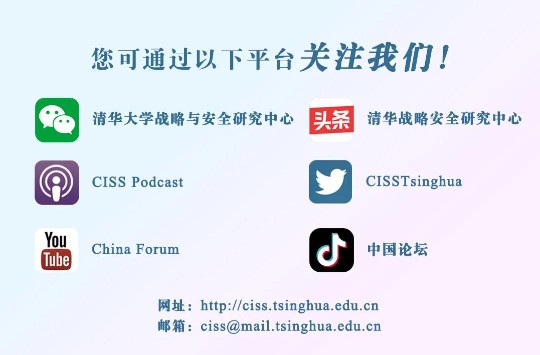一、十年飞跃之中国的全球倡议
1. “一带一路”倡议由中国政府于2013年提出,目前已在70多个国家实施。当全球化在美国和欧洲越来越失去公众支持之际,中国的 “一带一路”倡议没有被地域限制, 反而日渐得到发展中国家以及发达国家的认可。1999年的中国还是国际开发协会 (IDA) 的最大借款国,在经历了20年的高速增长之后,中国已在2019年取代世界银行成为世界上最大的发展金融贷款机构。
Until 1999, China was the largest borrower from the International Development Association (IDA), the member of the World Bank Group responsible for lending to the world's poorest countries. Two decades of high growth later, in 2019, China overtook the World Bank as the world's largest lender of development finance. This remarkable change is owed primarily to the Belt and Road Initiative (BRI), a global infrastructure plan conceptualized in China in 2013 and which has been implemented in more than 70 countries. Under the BRI, China works with partner countries to design and implement large infrastructure projects. Such transformative, national-scale investment is naturally attractive to poor countries, and helps explain why they, as well as some rich countries, are willing to turn to the BRI.
(July 6, 2020. “Demystifying the Belt and Road Initiative.” Rand Corporation)
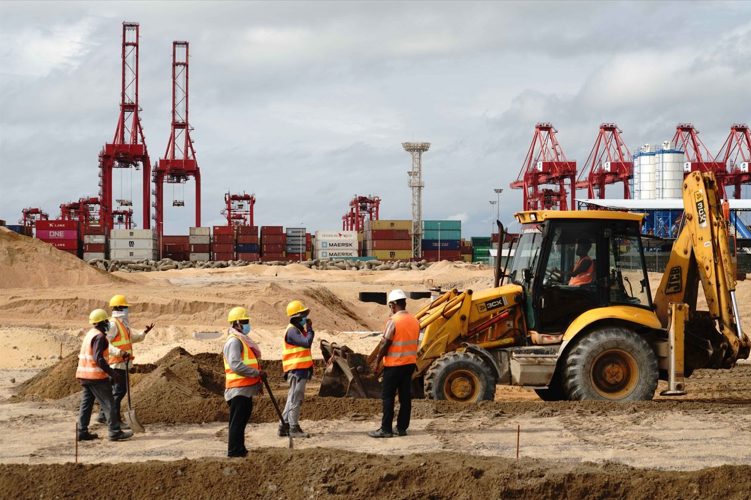
(图片来源:WSJ)
While globalization is losing public support in the U.S. and Europe, Xi’s “Belt and Road Initiative” (BRI) has met with increasing acceptance from both developing and developed countries hoping to cash in on Chinese largesse. Indeed, China’s outreach seems to have no geographic limits, with New Zealand and South Africa among those to sign a memorandum of understanding (MOU) with China to jump on the “Belt and Road” bandwagon.
(May 10, 2017. “Chinese Spending Lures Countries to its Belt and Road Initiative.” Bloomberg)
2. 在迎接全球卫生挑战方面,中国正处于全球卫生治理的领先地位。中国与世界卫生组织 (WHO) 等其他组织有着密切的合作,也在过去的十年里增加了对发展中国家的健康相关援助。中国正在引领全球消除疟疾的努力,也为2014的西非埃博拉疫情提供了1.23亿美元的捐款。中国政府倡议筹建的亚投行也一直在为发展中国家提供大量的新冠疫苗资金。
China is leading on global health governance at a critical time. Many poorer states do not have the funds to address serious health challenges. China is increasingly stepping in to fill that void. It cooperates with the World Health Organization (WHO) and other groups and in the past decade has increased health-related aid to developing states. China is leading the global effort to eradicate malaria in eastern Africa. During the Ebola epidemic in western Africa in 2014, China launched its largest response ever to an international humanitarian crisis, contributing $123 million.
(“China’s Approach to Global Governance.” Council on Foreign Relations)
China-backed Asian Infrastructure Investment Bank (AIIB) will continue to finance developing countries acquire COVID-19 vaccines. Last year, AIIB had set up a funding facility to help public and private sectors fight the pandemic. The investment bank has approved 42 projects amounting to over $10.3 billion, as of Nov. 5. Its Crisis Recovery Facility has up to $13 billion allocated to support AIIB members and clients in withstanding economic and health impacts of the health crisis.
(November 5, 2021. “AIIB to Continue Vaccine Funding for Developing Nations in 2022.” Reuters)
3. 在应对全球气候变化领域,中国在全球绿色技术和减排方面的进步显著,且独具优势。中国拥有领导全球可再生能源行业所需的政治动机、经济能力和道德共识。在可再生能源的生产和发展领域,包括电动车、太阳能电池板和风力涡轮机等,中国都处于世界领先地位。亚投行计划在2023年7月1日前实现将其所有投资项目与《巴黎协定》相关目标完全保持一致。可以说,中国的绿色进步是老牌工业化经济体得以在减少全球经济碳足迹方面取得重要进展的原因之一。
China has worked with existing international institutions and has been a leader on climate change. In 2015, the United States partnered with China to call for a strong, legally binding treaty that ultimately became the Paris Agreement. Now Beijing is trying to save the agreement as others, including the United States, retreat.
(“China’s Approach to Global Governance.” Council on Foreign Relations)
The Asian Infrastructure Investment Bank plans to fully align its operations with the Paris Agreement climate goals by July 1, 2023. The bank said it currently expects to approve $50 billion in climate finance-related projects by 2030.
(October 26, 2021. “AIIB to Fully Align with Paris Agreement climate goals by mid-2023.” Reuters)
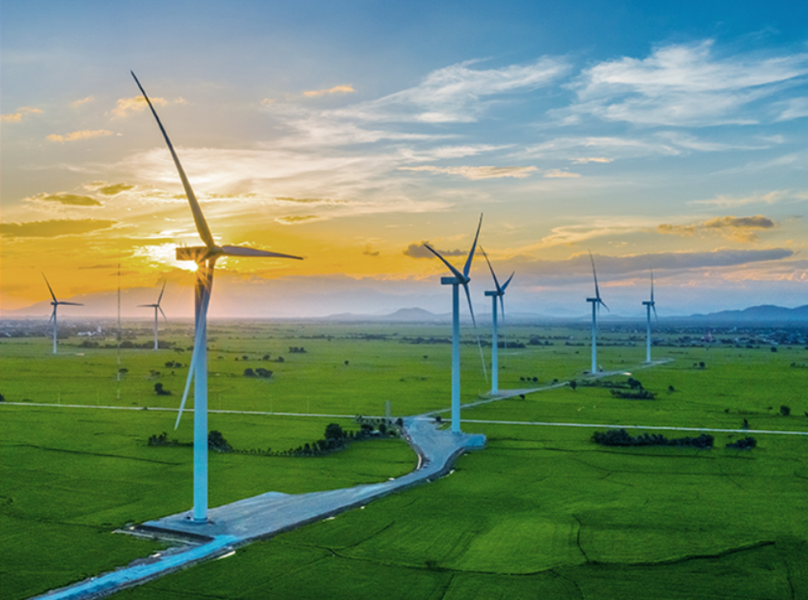
(图片来源:AIIB)
The international community should be assured that China is genuinely interested in leading the world in one particular sector: deployment and investment in renewable energy.China is currently the world’s largest producer of wind and solar energy,and the largest domestic and outbound investor in renewable energy. In contrast to the United States government’s retreating commitment to the industry under President Donald Trump, China has the political incentive, economic capability, and moral consensus needed to lead the global renewable energy sector.
(October 6, 2017, “The East Is Green: China’s Global Leadership in Renewable Energy.” Center for Strategic and International Studies)
China’s advances in green technology have universal benefits that policymakers must not discount. Germany’s economic minister, Peter Altmaier, has argued that German auto companies need to start manufacturing their own electric-vehicle batteries. But if Germany raised its auto-battery game, it would do so on the back of ten years of collaboration with innovative Chinese companies, such as BYD and CATL. The story is not all that different with solar panels, wind turbines, or grid storage. China’s green advances are one reason that older industrialized economies have gotten as far as they have in reducing the global economy’s carbon footprint.
(February 28, 2020, “How China Became the World’s Leader in Green Energy.” Foreign Affairs)
二、十年飞跃之多边组织下的国际合作
1.在联合国,中国积极参与联合国各领域的工作,敦促联合国关注发展中国家的关切和需求,支持联合国和平与发展事业,不断为国际社会抗击疫情、推动经济复苏、加快落实2030年可持续发展议程做出的新贡献。
China has taken an active part in the work of the UN in all areas, and urged the UN to focus on the concerns and needs of developing countries. In September 2015, when attending the summits marking the 70th anniversary of the UN, President Xi Jinping announced China's decision to establish a China-UN Peace and Development Fund. To date, China has provided US$120 million to the fund and launched 112 cooperation projects, giving support to UN's work on peace and development.
In September 2020, during the high-level meetings marking the 75th anniversary of the UN, President Xi Jinping announced that China would provide another US$50 million to the UN COVID-19 Global Humanitarian Response Plan, provide US$50 million to the China-FAO South-South Cooperation Trust Fund (Phase III), extend the China-UN Peace and Development Fund by five years after it expires in 2025, and actively support the UN in setting up the UN Global Geospatial Knowledge and Innovation Center and an International Research Center of Big Data for Sustainable Development Goals in China. These are part of China's new contribution to the international efforts to defeat the coronavirus, restart the economy, and accelerate the implementation of the 2030 Agenda for Sustainable Development.
China actively responded to the UN-initiated Global Humanitarian Response Plan, providing assistance in kind to over 150 countries and international organizations and exporting medical supplies to over 200 countries and regions. In total, it has extended to the world over 320 billion masks, 3.9 billion protective suits and 5.6 billion testing kits. China supports the Strategy to Achieve Global COVID-19 Vaccination by mid-2022 launched recently by the WHO, and has honored its commitment of making vaccines a global public good. As of mid-October 2021, China has contributed over 1.5 billion doses of COVID-19 vaccines to over 100 countries and international organizations, contributing significantly to building a global immunity defence.
(October 22,2021,Ministry of Foreign Affairs of the People’s Republic of China, Position Paper on China’s Cooperation with the United Nations)
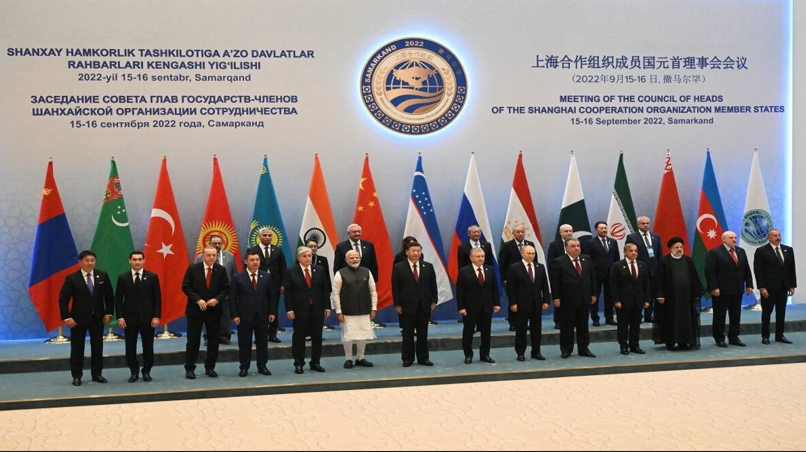
(图片来源:Reuters)
2.作为上合组织重要创始成员国,中国一直重视、支持和推动上合组织发展。中国向上海合作组织投资850亿美元,是其最大的资助者。中方积极倡导和践行新安全观,推动《反极端主义公约》达成,推动建立中国-上海合作组织国际司法交流培训基地等一系列交流平台。中方与上合组织还建立了睦邻友好合作委员会、青年交流营、成员国政府奖学金、环境信息共享平台、科技伙伴计划、医学研究中心等,深化了同成员国的人文交流。
China has vigorously advocated the Shanghai Spirit for building a harmonious region. China invested US$85 billion in the SCO and is its largest financial supporter. Among major moves, China advocated and practiced a new vision on security, promoted conclusion of the Convention against Extremism, and helped establish a training base for international judicial exchanges between China and SCO. China set up an SCO demonstration base for agricultural technology training and exchange in Yangling City in Shaanxi Province, and a China-SCO economic demonstration zone and a technology transfer center in Qingdao in Shandong Province. A demonstration base for local health cooperation in Hubei Province is proposed. Chin’s other ventures with SCO are a committee on good-neighborliness, friendship and cooperation, youth exchange camp, government scholarships in member states, environmental information sharing platform, science and technology partnership program, and medical research center. Through these measures, China deepens cultural and people-to-people exchanges with member states.
(December 3, 2021, China institute of international studies, 20 Years of the SCO: Development, Experience and Future Direction)
3.中国加入世界贸易组织后,实质上开放了商品和服务市场。工业品目前的平均关税税率已从14.8%降至目前的7.4%,比加入时的承诺低2.8%。在服务贸易方面,已开放近120个部门,比加入时商定的多20个。过去10年里,世贸组织在中国项目下广泛开展活动,包括为入世谈判代表提供交流经验和教训的平台,为世贸组织的实习项目做出贡献,支持最不发达国家更有效地参与多边贸易体制等。
With its accession to the WTO, China substantively opened its market of goods and services. The average current tariff rates of manufactured goods have been lowered from 14.8% to the current 7.4% — 2.8% lower than the accession commitments. For trade in services, nearly 120 sectors have been opened up — 20 more than what was agreed upon accession. The continued opening up and reform fundamentally promoted China's development. Over the past 20 years, China grew from the sixth to the second largest economy of the world, with its GDP increasing 11-fold to almost USD 15 trillion. Furthermore, China has secured a complete victory in the battle against extreme poverty, eliminating it for the first time in a history of thousands of years.
(December 10, 2022, World Trade Oganization, High-Level Forum marks 20 years of China’s WTO membership)
Activities carried out under the China Programme over the last 10 years, such as providing a platform for accession negotiators to share experiences and lessons, contributing to the WTO's internship programmes and supporting the more effective participation of LDCs in the multilateral trading system.
(January 20,2022, World Trade Oganization, Tenth China Round Table looks at impact of 10 years of China Programme on LDC accessions)
三、中国推进解决全球性问题的努力和承诺
1. 动荡世界中,中国正带来弥足珍贵的确定性。中国始终是世界和平的建设者、全球发展的贡献者、国际秩序的维护者、公共产品的提供者、热点问题的斡旋者。
China firmly supports the purposes and principles of the United Nations (UN) Charter, the UN’s central role in international affairs, the important role of the UN General Assembly in addressing global challenges, and the work of the President of the UN General Assembly.
(September 25, 2022, CGTN, Chinese FM: China supports the UN's central role in intl affairs)
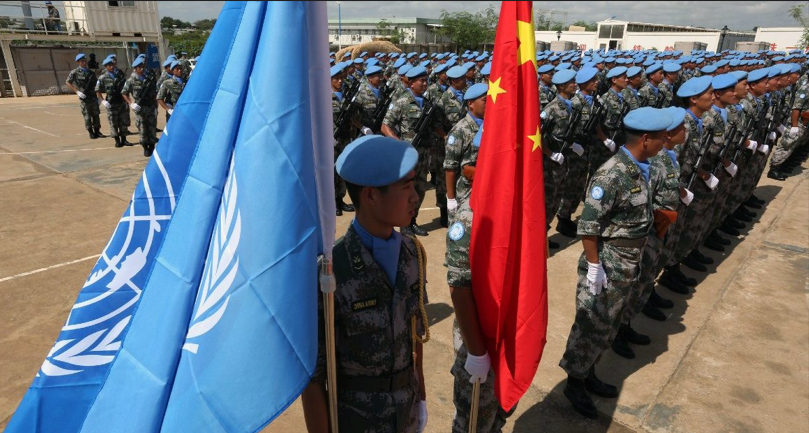
(图片来源:Modern War Institute)
Poverty Alleviation-China achieved its goal of eradicating absolute poverty as scheduled, improving the living standards of hundreds of millions of people through decades of hard work.
Global Development Initiative -The China-Pacific Island Countries Climate Action Cooperation Center has been established, Wang said. The Global Development and South-South Cooperation Fund was also launched to support the cooperation projects of the GDI. Since the beginning of this year, China has provided emergency food assistance to developing countries and will continue to do so, according to Wang.
(September 24, 2022, Xinhua, China Focus: China's contributions to global development)
China was upholding the international order and committed to the principles of the UN Charter and had backed the UN-centred international system. “China has been involved in multilateral affairs in all fields and... fulfilled in good faith its international obligations. China abides by the Universal Declaration of Human Rights and has made relentless efforts to protect and strengthen its human rights.”
(September 24, 2022, UN News, At UN, Foreign Minister Wang Yi sees ‘hope’ in turbulent times, reaffirms ‘One China’ policy)
A case in point is that China has played a key role in building global partnership to cope with climate change. China's efforts in achieving “dual carbon” goals, namely reaching peak carbon dioxide emissions before 2030 and achieving carbon neutrality before 2060, will surely lend strong impetus to the world, fulfilling the goals set out in the Paris Agreement.
(September 26, 2022, Global Times, Global development and security initiatives will empower international stakeholders afresh)
China has renewed its calls for talks to resolve the ongoing Ukraine crisis as Foreign Minister Wang Yi met his Russian counterpart Sergey Lavrov for the first time since Vladimir Putin’s latest threat to use nuclear weapons.
“China will continue to uphold an objective and fair position to promote peace talks and hopes that all parties will not give up on dialogue efforts and insist on resolving security concerns through peace talks,” Wang said during the meeting at the United Nations in New York.
(September 22, 2022, South China Morning Post, China repeats call for talks to end Ukraine war after Vladimir Putin threatens to use nuclear weapons)
2. 国家主席习近平在博鳌亚洲论坛2022年年会开幕式上郑重提出全球安全倡议,强调安全是发展的前提,人类是不可分割的安全共同体,呼吁国际社会共同走出一条对话而不对抗、结伴而不结盟、共赢而非零和的新型安全之路。当前,时代之变和世纪疫情相互叠加,世界进入新的动荡变革期。全球安全倡议为合作应对全球共同挑战、维护世界和平安宁贡献了中国方案,为携手共建持久和平、普遍安全的人类命运共同体指明了前进方向。
Since actions are always guided by vision, it is worth noting that President Xi Jinping is the author of the Global Security Initiative concept. He coined it during his keynote speech at the Boao Forum for Asia Annual Conference 2022 in April, titled “Rising to Challenges and Building a Bright Future Through Cooperation.”
Being the fruit of President Xi's Thought on Diplomacy, the Global Security Initiative provides a united response to the increasingly complex challenges facing the international community by significantly improving and going beyond the Western “imperialist, racist, and environmentally determinist geopolitics of the 1940s.” This is done by introducing “six commitments” that underpin his theory and uphold the principle of “indivisible security” – the concept first used in the 1975 Helsinki Final Act and other successive security agreements like the 1990 Paris Charter.
As opposed to what is argued by its detractors, the Global Security Initiative does not seek to change the international system with the UN at its center or the international order based on international law; on the contrary, it aims to push for full adherence to the UN Charter and respect for the globally recognized international rule of law, not vaguely defined and detached from the legal reality "rules-based order."
(September 22, 2022, CGTN, China’s Global Security Initiative – ‘for the many, not the few’)
编辑:宋忆宁 王翊宣 孙一苇 审核:许馨匀 张立荣
